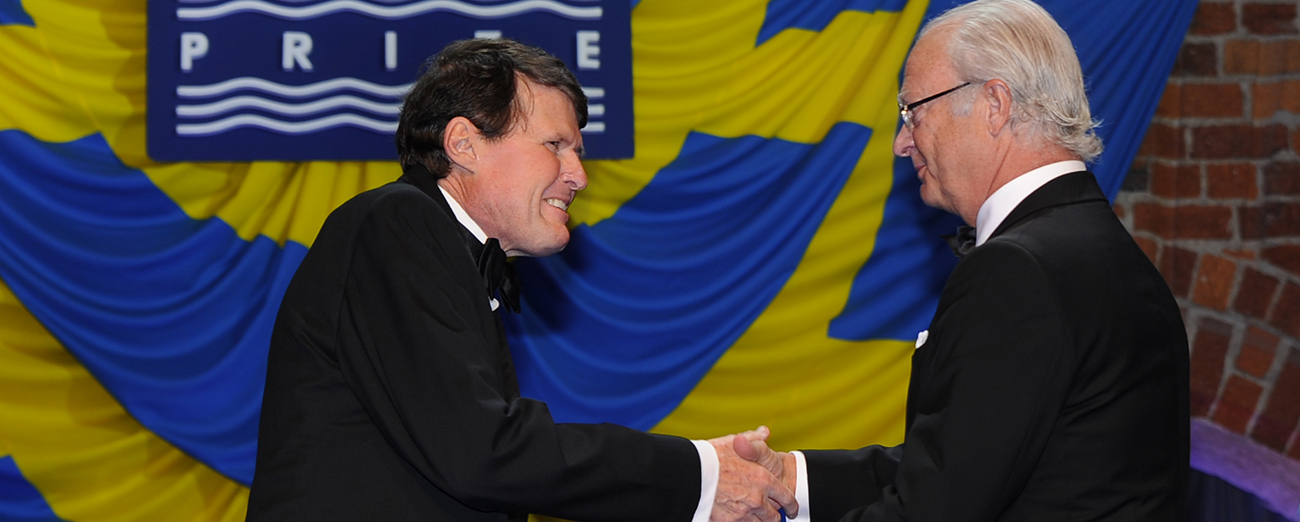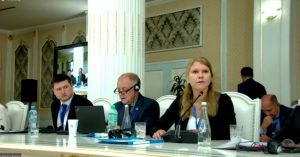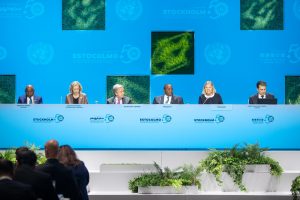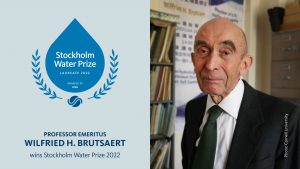Giant in global water management receives Stockholm Water Prize
Stockholm (2014-09-04) – Professor John Briscoe of South Africa today received the 2014 Stockholm Water Prize for his unparalleled contributions...
Stockholm (2014-09-04) – Professor John Briscoe of South Africa today received the 2014 Stockholm Water Prize for his unparalleled contributions to global and local water management, inspired by an unwavering commitment to improving the lives of people on the ground. H.M. King Carl XVI Gustaf of Sweden presented the prize to Prof. Briscoe at a Royal Award Ceremony during World Water Week in Stockholm.
In its citation, the Stockholm Water Prize Committee stated that Professor John Briscoe ”has combined world-class research with policy implementation and practice to improve the development and management of water resources as well as access to safe drinking water and sanitation.”
On receiving the award, Professor Briscoe said he was “deeply honoured”, and that “one of my blessings is having had such great mentors.”
Today’s world is beset by daunting water challenges – human water security and biodiversity are at risk, global demand for water is soaring, and droughts and floods cause deadly disasters. These challenges cannot be met on one front alone. Professor Briscoe’s genius lies in his fusion of science, policy and practice, giving him unrivalled insights into how water should be managed to improve the lives of people worldwide.
Prof. Briscoe said: “I would like to emphasise the role of thinking practitioners, a group I am proud to be part of. It is not an academic job, nor is it a nine-to-five-fixing-bolts job. They are engaged in action, in a cycle of challenges and responses. I would like to quote Mike Tyson, who has said that ‘Everyone has a plan until you get smacked in the face’. It is about the ability to adjust to new circumstances.”
In the mid 1970s Briscoe lived in a small village in the interior of Bangladesh, and learned first-hand how infrastructure for protection from floods and droughts could transform the lives of the poor. Later in the 1970s Briscoe worked as an engineer in the government of newly independent Mozambique, learning that you were a credible policy maker only if you could help resolve basic problems of building and running infrastructure.
“At the end of the day, it is what happens on the ground that matters. All policies must be judged by whether they make a difference on the ground. I believe that the years I spent working at the micro level is what enables me to be an effective policy maker,” said Briscoe.
At the other end of Professor Briscoe’sspectrum of accomplishments is the 2003 Water Strategy for the World Bank. This strategy provided a new, creative and enduring benchmark for global understanding of the need for both better infrastructure and improved institutions. The strategy has had implications far beyond the water sector, helping to ensure that developing and emerging countries get a stronger voice in global governance.
Professor Briscoe brought his experience of high-level policy with him to Brazil as the World Bank Country Director in 2005. Brazil was one of the biggest of the World Bank’s borrowers, and John Briscoe was praised for bridging the divide between sound environmental management and economic development objectives in the Amazon and other parts of this rapidly developing nation.
Professor Briscoe has become known for his passionate commitment to sustainable economic development, his disrespect for constructed boundaries between sectors and people, and for his insistence that the voice of people who are affected be heard.
“It is vital to give primary attention to the effect on people who will live with the consequences of policies and projects. Equally important is the voice of political leaders who have to take account of all of their people and who have to make difficult choices among competing priorities.”
About John Briscoe
Professor John Briscoe did his undergraduate studies in civil engineering at the University of Cape Town and his Ph.D. in environmental engineering at Harvard University. He has worked in dozens of countries around the world, and lived in his native South Africa, the United States, Bangladesh, Mozambique, India and Brazil. Professor Briscoe’sscientific expertise encompasses engineering, nutrition, epidemiology, demography, anthropology, political science and economics. Professor Briscoe is known for his courage and pragmatism in tackling controversial issues, ranging from conflicts on international waters to novel approaches to integrating infrastructure, institutions and environmental sustainability in river basins. As a professor in the schools of Engineering and Applied Science, Public Health and Government at Harvard University, his focus is on educating “the next generation of specialised integrators” – people who are deeply schooled in a discipline but also know how to work across disciplines. John Briscoe was born in Brakpan in South Africa. He is 66 years old, and a citizen of South Africa and Ireland.
About Stockholm Water Prize
The Stockholm Water Prize is a global award founded in 1991 and presented annually by the Stockholm International Water Institute (SIWI) to an individual, organisation or institution for outstanding water-related achievements. The Stockholm Water Prize Laureate receives USD 150,000 and a crystal sculpture specially designed and created by Orrefors. H.M. King Carl XVI Gustaf of Sweden is patron of the prize.
Initially founded by the Stockholm Water Foundation to encourage research and development of the world’s water environment, the Stockholm Water Prize is additionally supported by the Royal Swedish Academy of Sciences, International Water Association, Water Environment Federation and the City of Stockholm. The Founders of the Stockholm Water Prize are companies united in their strong conviction to push sustainability in the water sector. They are: Bacardi, Borealis & Borouge, DuPont, ERV, Fujitsu, Grundfos, HP, Kemira, KPMG Sweden, Ragn-Sells, Scandic, Scandinavian Airlines (SAS), SJ (Swedish Railways), Snecma/Safran, Xylem and Ålandsbanken.
About Stockholm International Water Institute
Stockholm International Water Institute (SIWI) is a policy institute that generates knowledge and informs decision-makers towards water wise policy and sustainable development. SIWI performs research, builds institutional capacity and provides advisory services in five thematic areas: water governance, transboundary water management, water and climate change, the water-energy-food nexus, and water economics. SIWI organises World Water Week in Stockholm – the leading annual meeting place for water and development issues – and hosts the Stockholm Water Prize, the Stockholm Junior Water Prize and the Stockholm Industry Water Award.
Note to Editors:
- Information about the World Water Week and the Stockholm International Water Institute; www.worldwaterweek.org and siwi.org
- Press kit, events, press releases and interview requests: www.worldwaterweek.org/pressroom
- Information about the 2014 Stockholm Statement on Water: siwi.org/stockholmstatement2014
- Photos and video: https://dev.siwi.org/mediahub
- Twitter: Follow @siwi_mediafor press updates #wwweek and @www_team for participant debates
- Essential background reading: SIWI’s report “Energy and Water: The Vital Link for a Sustainable Future”,feeding into the discussions at World Water Week.







